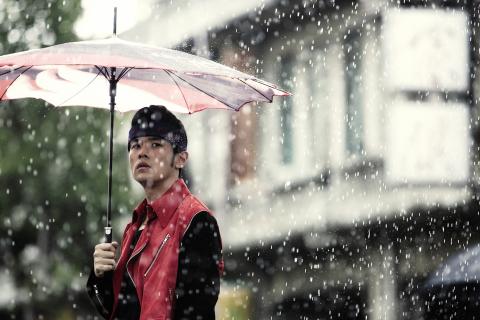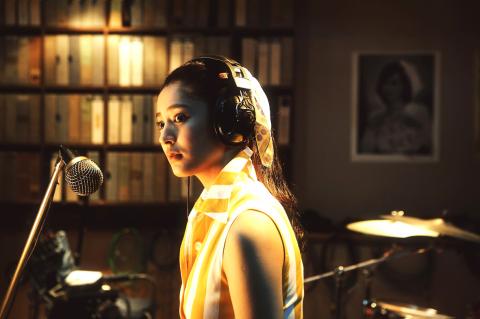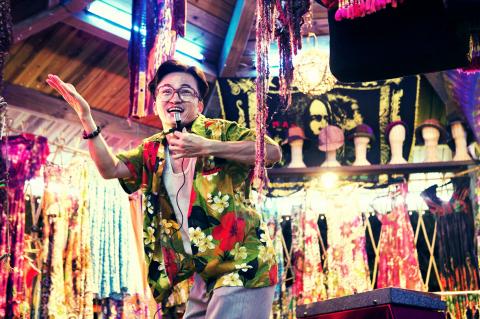Six years after his directorial debut Secret (不能說的祕密), Mando-pop star Jay Chou (周杰倫) returns with The Rooftop (天台), a hyper-ostentatious musical in which he realizes the dream of every straight boy by becoming a kung-fu hero and winning the lady’s heart.
But unlike the well-crafted Secret, a simple but satisfying puppy-love story, Chou’s ambitious second feature has gone too far in its pursuit of technical excellence and loses sight of its purpose of telling a relatable story.
Set in the fictional city of Galilee, the movie centers on Wax (Chou) and his buddies, a carefree bunch who while their youthful days away riding around town, getting into trouble and helping out at Dr. Bo’s (Hong Kong veteran Eric Tsang, 曾志偉) Chinese medicine pharmacy, where they learn kung-fu from the jolly old Bo.

Photo courtesy of Chuang Ying Picture
By night, the friends return home to the titular Rooftop, a ramshackle settlement built on top of an old building in the seedy part of town. Though penniless, the rooftop’s dwellers are a cheerful gang, ready to burst into song and dance at any time and take care of each other like a big family.
Wax’s blithe life changes when he meets his dream girl Starling — played by newcomer Li Xinai (李心艾) from China — who has been forced into the entertainment business by her gambling father (Hong Kong’s Chung Chun-to, 鍾鎮濤).
Wax soon wins the belle’s heart, but their innocent love doesn’t last long. Facing the rich and corrupt movie star William (Taiwanese singer Darren, 邱凱偉), who salivates over Starling’s beauty, and a band of much more sinister mobsters, the hero must prove his mettle and save the girl from falling into the hands of the wicked.

Photo courtesy of Chuang Ying Picture
Credited as director, scriptwriter, actor and songwriter, Chou successfully creates a visually opulent fairy tale bursting with retro sensibilities, with a little help from his top-notch international production crew including cinematographer Mark Lee (李屏賓).
Vintage cars, disco colors and hippie-inspired fashion fill every frame, while the meticulous work of multi-award winning costume designer Wu Li-lu (吳里璐) renders the movie a male version of Sex and the City.
The same amount of effort is invested in crafting the movie’s atmosphere. From the bright neon lights at Bo’s pharmacy, to the romantic backdrop on the rooftop that recalls Baz Luhrmann’s Moulin Rouge!, the ornate sets by the internationally acclaimed art director Akatsuka Yoshihito from Japan — whose works include Kill Bill I and Seediq Bale (賽德克巴萊) — firmly root the movie in a fantastic realm with all traces of reality removed.

Photo courtesy of Chuang Ying Picture
A spectacular example is the night market scene at which the love between Wax and Starling buds. Built from scratch in a scenic area in Greater Tainan, the bustling night market looks like a glittery mirage floating on a lake, accessible only by swan-shaped paddleboats.
To Chou’s credit, the movie is not short on audiovisual wonders, which are part of any musical’s allure. The musical numbers are masterfully choreographed and occasionally show off Chou’s well-trained biceps. Sometimes, stunning visual effects are not created with a computer, but by ingenious camera work and clever art design.
The technical perfection, however, cannot make up for the absence of genuine emotions and feelings necessary for keeping viewers engaged and moving along with the melodramatic flow. The Rooftop is essentially all about Jay Chou, the Mando-pop king. His part doesn’t demand much acting: Chou plays himself and spends considerable screen time wooing the girl, who doesn’t do much except smile sweetly, and hanging out with his real-life buddies such as Devon Song (彈頭). The rest of the movie is Chou’s fantasy come true: He is the martial-arts hero who beats up bad guys and saves the beauty. Unfortunately, neither the star nor his fantasy is particularly interesting.
With hackneyed plots and wooden performances by the two leads, Chou’s The Rooftop remains a glossy confection, impressive at first sight but quickly forgotten.

Towering high above Taiwan’s capital city at 508 meters, Taipei 101 dominates the skyline. The earthquake-proof skyscraper of steel and glass has captured the imagination of professional rock climber Alex Honnold for more than a decade. Tomorrow morning, he will climb it in his signature free solo style — without ropes or protective equipment. And Netflix will broadcast it — live. The event’s announcement has drawn both excitement and trepidation, as well as some concerns over the ethical implications of attempting such a high-risk endeavor on live broadcast. Many have questioned Honnold’s desire to continues his free-solo climbs now that he’s a

As Taiwan’s second most populous city, Taichung looms large in the electoral map. Taiwanese political commentators describe it — along with neighboring Changhua County — as Taiwan’s “swing states” (搖擺州), which is a curious direct borrowing from American election terminology. In the early post-Martial Law era, Taichung was referred to as a “desert of democracy” because while the Democratic Progressive Party (DPP) was winning elections in the north and south, Taichung remained staunchly loyal to the Chinese Nationalist Party (KMT). That changed over time, but in both Changhua and Taichung, the DPP still suffers from a “one-term curse,” with the

Jan. 26 to Feb. 1 Nearly 90 years after it was last recorded, the Basay language was taught in a classroom for the first time in September last year. Over the following three months, students learned its sounds along with the customs and folktales of the Ketagalan people, who once spoke it across northern Taiwan. Although each Ketagalan settlement had its own language, Basay functioned as a common trade language. By the late 19th century, it had largely fallen out of daily use as speakers shifted to Hoklo (commonly known as Taiwanese), surviving only in fragments remembered by the elderly. In

William Liu (劉家君) moved to Kaohsiung from Nantou to live with his boyfriend Reg Hong (洪嘉佑). “In Nantou, people do not support gay rights at all and never even talk about it. Living here made me optimistic and made me realize how much I can express myself,” Liu tells the Taipei Times. Hong and his friend Cony Hsieh (謝昀希) are both active in several LGBT groups and organizations in Kaohsiung. They were among the people behind the city’s 16th Pride event in November last year, which gathered over 35,000 people. Along with others, they clearly see Kaohsiung as the nexus of LGBT rights.